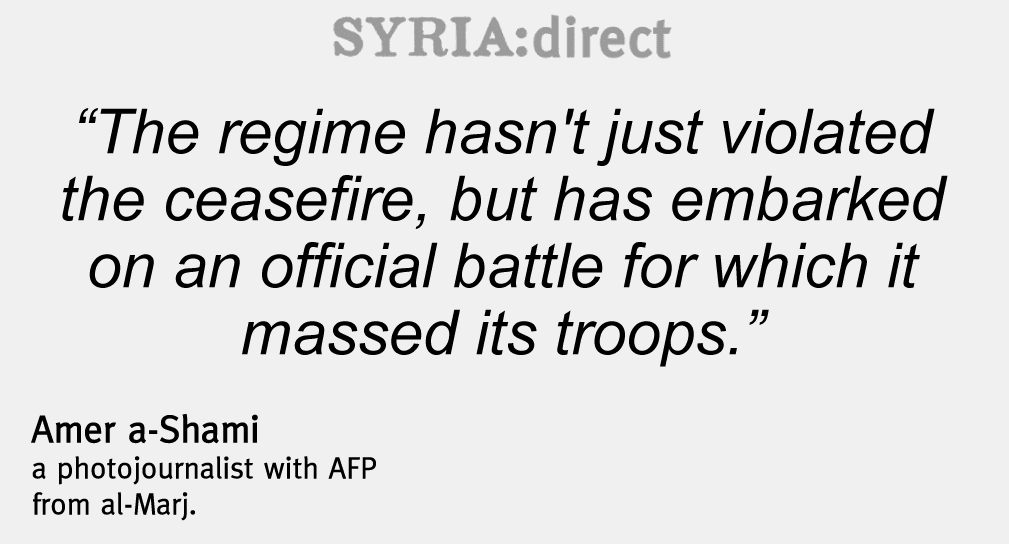‘The regime hasn’t just violated the ceasefire, but embarked on an official battle’
AMMAN: The Syrian regime has captured new agricultural territory in […]
1 March 2016
AMMAN: The Syrian regime has captured new agricultural territory in Damascus’s East Ghouta suburbs despite an ongoing ceasefire, a local rebel spokesman and two journalists told Syria Direct on Tuesday.
The internationally brokered ceasefire agreement that went into effect on Saturday presented the Syrian Arab Army with an opportunity to take more ground as rebels put down their weapons, said an FSA-affiliate spokesman.
“The freezing of fronts in some areas allowed the regime…to surprise rebels in East Ghouta with huge numbers of forces that it summoned from the cold [i.e., less active] fronts,” Wael al-Alwan, spokesman with Feilaq a-Rahman in the contested area, told Syria Direct Tuesday.
On Monday, regime forces advanced in the al-Marj region, comprised of 28 villages 14 km east of central Damascus. They took control of the Agricultural Center, a trade school that rebels had turned into a military base, along with al-Fadhaiya, a village that was formerly home to satellite television broadcast stations in the center of al-Marj, said al-Alwan.
Al-Marj is considered the breadbasket of East Ghouta and consists of fertile agricultural land. Rebels held most of the al-Marj region until late 2015, when the regime began an offensive in the area and captured the village of Marj a-Sultan and the airport within it, reported al-Jazeera on December 12.
The regime continued to make progress in al-Marj into the new year, with state-owned news agency SANA reporting on February 16 that the Syrian Arab Army had captured “a number of farms” in the area.
Rebels hoped that the ceasefire would provide some respite on the al-Marj front. A regime takeover of the fertile area will squeeze residents of East Ghouta—encircled for nearly four years—even harder, says one fighter on the ground.
“The regime’s advance in al-Marj could mean the starvation of East Ghouta residents,” Abu Hamza, a local opposition fighter, told Syria Direct.
Monday’s offensive in al-Marj is reportedly not the regime’s first ceasefire violation in the East Ghouta suburbs. Hours after the ceasefire went into effect on Saturday, the regime hit the village of Bala in southern East Ghouta with three missiles, and then launched a failed attempt to storm the village, reported pro-opposition All4Syria that day.
But Monday’s attack is noteworthy in that it involves a concerted ground advance with large numbers of soldiers.
“The regime hasn’t just violated the ceasefire, but embarked on an official battle for which it massed its troops,” Amer a-Shami, a photojournalist with AFP, told Syria Direct Tuesday from al-Marj.
Russia and the United States hammered out a “cessation of hostilities” agreement on February 11, the final terms of which were announced on February 22 and took effect on 12am Saturday.
The agreement provided that signatory parties “refrain from acquiring or seeking to acquire territory from other parties to the ceasefire,” and allow unfettered humanitarian access to civilians in areas under their control.
The terms do not apply to military operations against the Islamic State, Jabhat a-Nusra, “or other terrorist organizations designated by the UN Security Council.”
The exclusion of Jabhat a-Nusra, the Al-Qaeda affiliate that Russia has often conflated with other rebel groups, from the ceasefire agreement as well as the Syrian army statement on February 24 that nearby Darayya is not included, have left East Ghouta residents wondering whether they are even covered under the agreement.
“I don’t know whether the East Ghouta fronts are excluded from the truce or not,” Mohammed al-Thaer, head of the Violations Documentation Center in East Ghouta, told Syria Direct Tuesday.
“From the first hours of the ceasefire, the regime never stopped bombing,” al-Thaer said. “The pace slowed down and then picked back up after 48 hours, and then the regime took over areas in al-Marj.”
Mohammed al-Thaer could not say definitively whether Nusra has a presence in al-Marj. The two strongest factions in the area are Feilaq a-Rahman and Jaish al-Islam, and both have signed on to the ceasefire agreement.
“Rebels are abiding by the ceasefire and authorized Riyad Hijab [head of the High Negotiations Committee that represents rebel groups at the international Geneva conference] to speak on our behalf,” said Feilaq a-Rahman spokesman al-Alwan.
“But we demand that everyone who oversaw the truce, to worked to make it happen, stop the regime’s violations.”







